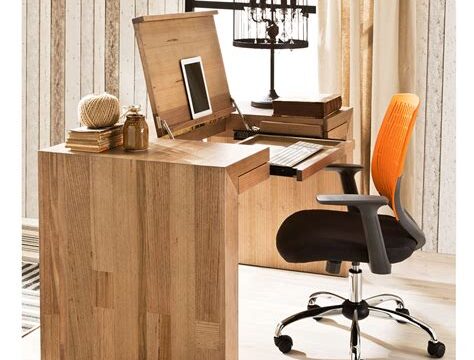Working from home has become the new norm for many people, and having a suitable workspace is essential for productivity and overall well-being. One of the most important elements of a home office is the desk, as it serves as the foundation for your work environment. In this blog post, we will discuss the key factors to consider when choosing the right desk for your home office. From understanding the importance of a suitable desk and evaluating your work requirements to considering ergonomic factors and exploring different desk materials and styles, we will cover everything you need to know to make an informed decision. Additionally, we’ll discuss storage options, desk organization, and budget-friendly solutions to help you create a functional and comfortable workspace. Whether you’re working with limited space or have specific ergonomic needs, we’ve got you covered. Let’s dive in and find the perfect desk for your home office.
The Importance of a Suitable Desk
When it comes to setting up a productive workspace, the suitable desk plays a crucial role. Your desk is not just a piece of furniture, but the foundation of your work environment. It is where you spend the majority of your day, so it’s important to choose a desk that meets your specific needs.
One of the main considerations when selecting a desk is the functionality it offers. Whether you need a large work surface for spreading out papers, or numerous storage options to keep your workspace organized, your desk should be able to accommodate your work requirements.
Furthermore, the ergonomic aspects of your desk are also significant. A suitable desk should support good posture and provide a comfortable workspace to help prevent strain and injury. Consider the height of the desk, the position of your computer monitor, and the chair you will use to ensure that they all work together to create an ergonomic workstation.
In addition, the style and material of the desk can contribute to the overall aesthetic of your office space. Whether you prefer a modern, minimalist look or a classic, traditional feel, there are various desk materials and styles to choose from that can complement your personal taste and the existing decor of your workspace.
Consider Your Work Requirements
Consider Your Work Requirements
When choosing a desk for your workspace, it’s important to consider your specific work requirements. Think about the tasks you typically perform at your desk on a daily basis. Do you need a large surface area for spreading out documents, or do you primarily work on a computer and require a designated space for your monitor, keyboard, and mouse? Consider whether you need built-in storage for files and office supplies, or if you prefer a minimalist desk with ample legroom. Understanding your work requirements will help you narrow down the desk options that best suit your needs.
Comfort and functionality should be top priorities when evaluating your work requirements for a desk. If you spend long hours at your desk, ergonomic features such as adjustable height, a comfortable chair, and proper lighting are essential. For tasks that involve frequent writing or typing, a desk with a smooth, spacious writing surface is a must. Factor in any specific equipment or tools you use regularly, such as a printer, scanner, or drawing tablet, to ensure that your desk can accommodate these items without feeling overcrowded.
Another important consideration for your work requirements is the need for privacy and focus in your workspace. If you work in a busy environment or share your living space with others, you may benefit from a desk that offers built-in privacy panels, cable management solutions to reduce distractions, and a layout that allows you to position your desk in a secluded area. On the other hand, if you thrive in a collaborative environment and frequently meet with colleagues or clients, a desk with ample surface area for group discussions and comfortable seating may be more suitable for your work requirements.
Ultimately, the key to selecting a desk that caters to your work requirements is to reflect on your daily tasks and habits. Take note of the activities that are integral to your work routine and prioritize features that enhance your productivity, comfort, and overall satisfaction in your workspace. By considering your work requirements when choosing a desk, you can create a functional and personalized workstation that supports your professional endeavors.
Evaluating Your Available Space
When it comes to choosing the right desk for your workspace, the first step is to evaluate the available space in your office or home. Measuring the dimensions of the area where you plan to place the desk is essential in ensuring that you select a desk that fits perfectly. Take into account the length, width, and height of the space, as well as any obstructions such as doors, windows, or electrical outlets. This will give you a clear understanding of the size constraints you are working with.
Additionally, consider the layout of the room and the flow of traffic. If the desk will be placed in a high-traffic area, such as a hallway or shared office space, you’ll need to choose a desk that won’t impede the movement of people. Adjustable desks or corner desks can be great options for maximizing space efficiency in smaller or busier areas.
Another important factor to consider is the overall aesthetic of the space. If you have a specific style or theme in mind for your office or home, you’ll want to choose a desk that complements the existing decor. Minimalist desks or floating desks can be great options for creating a sleek and modern look, while traditional desks or antique desks can add a touch of elegance to a room.
By carefully evaluating your available space, you can make an informed decision when selecting a desk that not only fits perfectly but also enhances the functionality and visual appeal of your workspace.
Ergonomic Considerations for Desk Selection
When selecting a desk for your workspace, it’s important to consider ergonomic factors that can impact your comfort and productivity. An ergonomic desk is designed to promote good posture and reduce strain on the body, helping to prevent common work-related injuries such as back pain, neck pain, and carpal tunnel syndrome.
One key ergonomic consideration is the height of the desk. The ideal desk height allows you to sit or stand comfortably with your arms at a 90-degree angle and your eyes level with the top of the monitor. This helps to reduce neck and shoulder strain, promoting better overall ergonomic health.
Another important factor to consider is the layout of the desk. A well-designed ergonomic desk will have ample space for your computer, keyboard, mouse, and any other accessories you use regularly. It should also provide storage options to keep your workspace organized and free of clutter, reducing strain on the body and promoting a more efficient work environment.
Lastly, when evaluating ergonomic considerations for desk selection, it’s important to consider the flexibility of the desk. Adjustable desks that allow you to switch between sitting and standing positions can help reduce the risk of prolonged sitting-related health issues, and can also promote better circulation and energy levels throughout the workday.
Different Desk Materials and Styles
When it comes to selecting a desk for your workspace, it’s important to consider the different desk materials and styles available. Each material has its own unique qualities and aesthetic appeal, and the style of the desk can greatly impact the overall look and feel of your workspace.
Wooden desks are a popular choice for many people, as they offer a classic and timeless look. They come in a variety of finishes, from light oak to deep mahogany, and can add warmth and sophistication to any office space. On the other hand, metal desks can provide a sleek and modern aesthetic, making them a great choice for contemporary work environments.
Another popular option is glass desks, which can create an open and airy feel in a room. They are often seen as a stylish and sophisticated choice, and can help to create the illusion of more space in smaller rooms. For those looking for a more unconventional option, consider a desk made from recycled materials or reclaimed wood, which can add an eco-friendly and unique touch to your workspace.
Ultimately, the desk material and style you choose will depend on your personal preferences, the overall design of your workspace, and the functionality you require. Whether you prefer the traditional look of a wooden desk, the contemporary feel of a metal desk, or the open and airy style of a glass desk, there are plenty of options to choose from that can complement your work environment.
Storage Options and Desk Organization
When it comes to setting up your home office, one of the key factors to consider is storage options and desk organization. Having a clutter-free workspace is essential for maintaining productivity and a clear mind. There are several options to choose from when it comes to storage solutions, and finding the right one for your needs is crucial.
One of the first things to consider is the amount of storage space you require. Do you need a lot of drawers for files and stationery, or do you prefer a minimalist look with more open shelving? Assessing your specific needs will help you narrow down the options and choose the most suitable storage solution for your desk.
In addition to storage space, desk organization is also important for maintaining a tidy workspace. Investing in desk organizers, cable management tools, and file holders can help keep your desk clutter-free and improve your overall efficiency. It’s important to tailor your organization system to your workflow and maintain a clutter-free environment.
Lastly, don’t forget to consider the aesthetic appeal of your storage options and desk organization. Choose storage solutions and desk organizers that complement the overall style of your home office and create a cohesive look. By taking the time to carefully select storage options and organize your desk, you can create an efficient and visually appealing workspace that enhances your productivity.
Budget-Friendly Desk Solutions
When it comes to setting up your workspace, budget-friendly desk solutions are a key consideration. Whether you’re working from home or outfitting an office, finding affordable yet functional desks can make a big difference in productivity and comfort.
One budget-friendly option to consider is a simple writing desk. These desks are often compact and streamlined, making them ideal for smaller spaces. Look for options with built-in storage, such as drawers or shelves, to maximize functionality without breaking the bank.
Another cost-effective desk solution is to repurpose a table as a desk. With the wide variety of tables available, from dining tables to folding tables, you can find a suitable surface for work that fits your budget. Don’t forget to consider the height and width of the table to ensure it meets your ergonomic needs.
For those who are particularly handy, DIY desk solutions can be a great way to save money. By repurposing materials or building from scratch, you can create a customized desk that fits your exact specifications without the high price tag.





